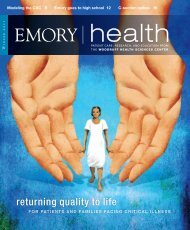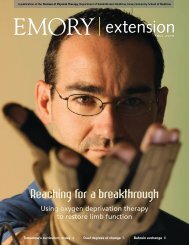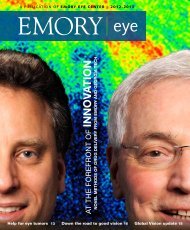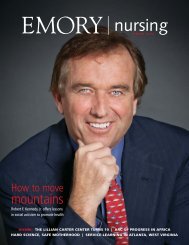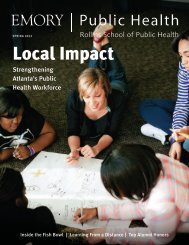Why do voles fall in love - Woodruff Health Sciences Center - Emory ...
Why do voles fall in love - Woodruff Health Sciences Center - Emory ...
Why do voles fall in love - Woodruff Health Sciences Center - Emory ...
You also want an ePaper? Increase the reach of your titles
YUMPU automatically turns print PDFs into web optimized ePapers that Google loves.
FEATURE LISTENING TO THE HORMONES<br />
Interest<strong>in</strong>gly, the subord<strong>in</strong>ates’ mount<strong>in</strong>g<br />
weight had no effect on their social status,<br />
but it did substantially <strong>in</strong>crease their levels of<br />
fat-derived hormones. Had this diet cont<strong>in</strong>ued,<br />
those hormones, comb<strong>in</strong>ed with exist<strong>in</strong>g<br />
high levels of the stress hormone cortisol,<br />
would almost certa<strong>in</strong>ly have caused the<br />
new fat to settle around ab<strong>do</strong>m<strong>in</strong>al organs,<br />
<strong>in</strong>creas<strong>in</strong>g the risk for diabetes and other<br />
metabolic problems—just as <strong>in</strong> people.<br />
The <strong>in</strong>crease [<strong>in</strong> food <strong>in</strong>take]<br />
suggests that the subord<strong>in</strong>ate<br />
animals’ set po<strong>in</strong>t had changed,<br />
as did their view of food as someth<strong>in</strong>g<br />
to alleviate their chronic<br />
stress and make them feel better.<br />
That scenario, however, didn’t develop<br />
because after three weeks, the researchers<br />
switched the available chow back to the<br />
lower-fat version. That’s when th<strong>in</strong>gs got<br />
really <strong>in</strong>terest<strong>in</strong>g. Hav<strong>in</strong>g no access to the<br />
high-caloric chow caused the subord<strong>in</strong>ate<br />
monkeys to become even more emotional<br />
and anxious when confronted with a stressful<br />
Robert Yerkes, shown with his<br />
first two great apes, Chim and<br />
Panzee, established the primate<br />
research center <strong>in</strong> 1930.<br />
6 EMORY HEALTH<br />
situation (for example,<br />
when an unfamiliar<br />
human <strong>in</strong>truder stared at<br />
them, someth<strong>in</strong>g monkeys<br />
hate). Astonish<strong>in</strong>gly,<br />
the subord<strong>in</strong>ate monkeys<br />
now ate the low-fat<br />
monkey chow <strong>in</strong> large<br />
quantities, much more<br />
than the <strong>do</strong>m<strong>in</strong>ant<br />
monkeys, far more than<br />
they themselves ate<br />
before hav<strong>in</strong>g been<br />
<strong>in</strong>troduced to the highcaloric<br />
chow.<br />
Wilson says the<br />
<strong>in</strong>crease suggests that<br />
the subord<strong>in</strong>ate animals’<br />
set po<strong>in</strong>t had changed, as did their view of<br />
food—any food—as someth<strong>in</strong>g to alleviate<br />
their chronic stress and make them feel<br />
better.<br />
The f<strong>in</strong>d<strong>in</strong>gs parallel work at Wake<br />
Forest’s primate center <strong>in</strong> which subord<strong>in</strong>ate<br />
rhesus monkeys self-adm<strong>in</strong>ister more<br />
coca<strong>in</strong>e than <strong>do</strong>m<strong>in</strong>ant ones. Wilson believes<br />
stress related to subord<strong>in</strong>ation dim<strong>in</strong>ishes<br />
the animals’ ability to f<strong>in</strong>d rewards <strong>in</strong> natural<br />
stimuli, caus<strong>in</strong>g them to seek out other<br />
th<strong>in</strong>gs to <strong>in</strong>crease activity <strong>in</strong> the bra<strong>in</strong>’s<br />
reward pathways. He is now collaborat<strong>in</strong>g<br />
with another Yerkes researcher <strong>in</strong> the<br />
neuro-imag<strong>in</strong>g center to literally watch what<br />
happens to the reward pathways <strong>in</strong> the bra<strong>in</strong>s<br />
of the subord<strong>in</strong>ate animals when they eat<br />
high-fat, high-sugar foods.<br />
Yerkes at a glance<br />
One of eight NIH-funded national primate research centers, Yerkes has been dedicated<br />
to advanc<strong>in</strong>g scientific understand<strong>in</strong>g of primate biology and behavior and to<br />
improv<strong>in</strong>g human health for nearly eight decades. Today, the center’s collaborative<br />
studies focus on development of an AIDS vacc<strong>in</strong>e, <strong>in</strong>sights on ag<strong>in</strong>g and drug addiction,<br />
understand<strong>in</strong>g progressive illness such as Park<strong>in</strong>son’s and Alzheimer’s, the<br />
role of hormones and behavior <strong>in</strong> health, and evolutionary l<strong>in</strong>ks between biology<br />
and behaviors like conflict and resolution. Almost two-thirds of the 3,300 non-human<br />
primates at Yerkes live <strong>in</strong> social colonies at a 117-acre field station <strong>in</strong> Lawrenceville,<br />
Georgia. Yerkes, which is part of the <strong>Woodruff</strong> <strong>Health</strong> <strong>Sciences</strong> <strong>Center</strong> at <strong>Emory</strong>, is<br />
the only U.S. primate center to have its own MRI, PET, and cyclotron (an accelerator<br />
that makes possible the study of subatomic structures <strong>in</strong> the cells).<br />
“We have tremen<strong>do</strong>us collaborative energy and scientific expertise at Yerkes,”<br />
says director Stuart Zola, “which we comb<strong>in</strong>e with a well-established animal colony<br />
and technical capabilities to advance science and ultimately improve human health.”<br />
What women want<br />
Sigmund Freud compla<strong>in</strong>ed that he couldn’t figure it out. ut.<br />
But when it comes to when to have sex or other matters, s,<br />
Yerkes neuroen<strong>do</strong>cr<strong>in</strong>ologist Kim Wallen knows what<br />
gets females’ <strong>in</strong>terest.<br />
In his study of toy preferences of monkeys, Wallen found that<br />
males preferred cars made of PVC pipes over plush <strong>do</strong>lls while<br />
females played equally with the cuddly and action toy choices.<br />
Rhesus macaque monkeys—similar to<br />
people <strong>in</strong> many ways but with shorter developmental<br />
cycles—offer Wallen the ability<br />
to change experimental variables to better<br />
understand how hormones affect gender differences<br />
<strong>in</strong> cognition and behavior.<br />
The Yerkes field station houses rhesus<br />
monkeys <strong>in</strong> social groups of 50 or more,<br />
allow<strong>in</strong>g the colony to establish<br />
social structures and<br />
relationships similar to those<br />
<strong>in</strong> nature. That makes a big<br />
difference <strong>in</strong> understand<strong>in</strong>g<br />
sexual behaviors, as <strong>do</strong>es<br />
the ability to conduct precise<br />
physiologic studies <strong>in</strong> liv<strong>in</strong>g<br />
animals.<br />
Older observational studies<br />
of a pair of male and<br />
female rhesus monkeys placed<br />
together <strong>in</strong> a cage seemed to<br />
<strong>in</strong>dicate that males wanted sex<br />
and females went along. In the<br />
natural sett<strong>in</strong>g, however, that’s<br />
not the way it works.<br />
Yes, males may be consistently<br />
<strong>in</strong>terested, but females<br />
are the ones who <strong>in</strong>itiate sex. If<br />
they <strong>do</strong>n’t <strong>in</strong>itiate it, it <strong>do</strong>esn’t<br />
happen. What motivates a<br />
female has less to <strong>do</strong> with the<br />
male’s personal appeal or status<br />
than what her hormones<br />
are say<strong>in</strong>g. It’s true that, as seasonal<br />
breeders, rhesus females<br />
may be <strong>in</strong>terested <strong>in</strong> sex only<br />
three to five months each<br />
year (when they can become<br />
pregnant). But it is curious that they rema<strong>in</strong><br />
<strong>in</strong>terested <strong>in</strong> sex even after they become rhesus<br />
senior citizens of 20 or 25. Wallen and his<br />
team study which hormones regulate sexual<br />
motivation, the results of which they believe<br />
will lead to better understand<strong>in</strong>g of the lack<br />
or loss of sexual desire <strong>in</strong> some women, especially<br />
after menopause.<br />
Another gender study <strong>in</strong> monkeys by<br />
Wallen and other Yerkes researchers looked<br />
at toy preferences of male and female<br />
macaques. As any human parent might have<br />
predicted, the 11 young rhesus males <strong>in</strong> the<br />
study never hesitated when given a choice<br />
between plush <strong>do</strong>ll-like toys or ones with<br />
wheels. The 23 females, however, were far<br />
less constra<strong>in</strong>ed <strong>in</strong> their preferences, play<strong>in</strong>g<br />
almost equally with plush and action toys.<br />
Wallen says the males’ strong, stereotypical<br />
preference for action toys parallels the<br />
action-packed way they play, just as the 23<br />
young females’ greater <strong>in</strong>terest <strong>in</strong> the plush<br />
toys parallels their greater <strong>in</strong>terest <strong>in</strong> real<br />
<strong>in</strong>fants. Such preference differences are<br />
unlikely to have occurred through socialization<br />
(monkeys <strong>do</strong>n’t watch ads or suffer<br />
teas<strong>in</strong>g from their playmates). Instead they<br />
may reflect permanent changes <strong>in</strong> preference<br />
result<strong>in</strong>g from the hormones they were<br />
exposed to <strong>in</strong> their mother’s womb. EH<br />
Spr<strong>in</strong>g Spr Spr<strong>in</strong>g <strong>in</strong>g ng 2 20 2010<br />
10 7








